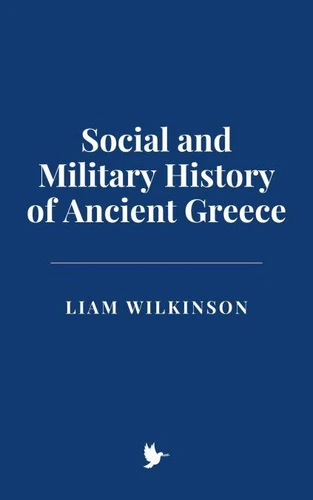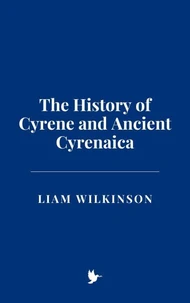Social and Military History of Ancient Greece
Par :Formats :
Disponible dans votre compte client Decitre ou Furet du Nord dès validation de votre commande. Le format ePub est :
- Compatible avec une lecture sur My Vivlio (smartphone, tablette, ordinateur)
- Compatible avec une lecture sur liseuses Vivlio
- Pour les liseuses autres que Vivlio, vous devez utiliser le logiciel Adobe Digital Edition. Non compatible avec la lecture sur les liseuses Kindle, Remarkable et Sony
 , qui est-ce ?
, qui est-ce ?Notre partenaire de plateforme de lecture numérique où vous retrouverez l'ensemble de vos ebooks gratuitement
Pour en savoir plus sur nos ebooks, consultez notre aide en ligne ici
- FormatePub
- ISBN8227149268
- EAN9798227149268
- Date de parution31/12/2024
- Protection num.pas de protection
- Infos supplémentairesepub
- ÉditeurBig Dog Books, LLC
Résumé
The social and military history of Ancient Greece offers a profound exploration of one of the most influential civilizations in human history. This work examines the intricate interplay between Greek social structures, political organization, and military practices, revealing how these elements shaped and were shaped by the unique dynamics of the polis. From the rise of the city-state in the Archaic period to the conquests of Alexander the Great and the emergence of the Hellenistic kingdoms, the narrative illuminates the evolution of Greek society and its enduring legacy.
The study delves into key themes such as the relationship between citizenship and military service, the ethical and philosophical reflections on war, and the economic and cultural underpinnings of conflict. Through analysis of primary sources-including the works of Homer, Herodotus, Thucydides, and Aristotle-paired with modern scholarship, this exploration provides a comprehensive understanding of the ideals and contradictions of Greek warfare and society.
Central to the discussion is the dual nature of war as both a creative and destructive force. While warfare fostered technological and tactical innovation, it also exposed the vulnerabilities of the polis and the limitations of Greek ideals. The emphasis on civic duty and collective identity, embodied in the hoplite phalanx, coexisted with stark inequalities and exclusions, including the reliance on slavery and the marginalization of women.
The decline of the polis and the rise of larger political entities, from Macedon to Rome, marked a significant transformation in Greek history, but the cultural and intellectual achievements of the Greeks ensured their influence endured. The book concludes by reflecting on the legacy of Greek social and military practices, highlighting their impact on subsequent civilizations and their relevance to contemporary questions of governance, ethics, and community.
This work seeks not only to recount the events and ideas of Ancient Greece but also to engage with its enduring questions, offering insights into the complexities of power, identity, and the human condition. Through the lens of Greece, it explores the universal challenges of war, peace, and the pursuit of justice in society.
The study delves into key themes such as the relationship between citizenship and military service, the ethical and philosophical reflections on war, and the economic and cultural underpinnings of conflict. Through analysis of primary sources-including the works of Homer, Herodotus, Thucydides, and Aristotle-paired with modern scholarship, this exploration provides a comprehensive understanding of the ideals and contradictions of Greek warfare and society.
Central to the discussion is the dual nature of war as both a creative and destructive force. While warfare fostered technological and tactical innovation, it also exposed the vulnerabilities of the polis and the limitations of Greek ideals. The emphasis on civic duty and collective identity, embodied in the hoplite phalanx, coexisted with stark inequalities and exclusions, including the reliance on slavery and the marginalization of women.
The decline of the polis and the rise of larger political entities, from Macedon to Rome, marked a significant transformation in Greek history, but the cultural and intellectual achievements of the Greeks ensured their influence endured. The book concludes by reflecting on the legacy of Greek social and military practices, highlighting their impact on subsequent civilizations and their relevance to contemporary questions of governance, ethics, and community.
This work seeks not only to recount the events and ideas of Ancient Greece but also to engage with its enduring questions, offering insights into the complexities of power, identity, and the human condition. Through the lens of Greece, it explores the universal challenges of war, peace, and the pursuit of justice in society.
The social and military history of Ancient Greece offers a profound exploration of one of the most influential civilizations in human history. This work examines the intricate interplay between Greek social structures, political organization, and military practices, revealing how these elements shaped and were shaped by the unique dynamics of the polis. From the rise of the city-state in the Archaic period to the conquests of Alexander the Great and the emergence of the Hellenistic kingdoms, the narrative illuminates the evolution of Greek society and its enduring legacy.
The study delves into key themes such as the relationship between citizenship and military service, the ethical and philosophical reflections on war, and the economic and cultural underpinnings of conflict. Through analysis of primary sources-including the works of Homer, Herodotus, Thucydides, and Aristotle-paired with modern scholarship, this exploration provides a comprehensive understanding of the ideals and contradictions of Greek warfare and society.
Central to the discussion is the dual nature of war as both a creative and destructive force. While warfare fostered technological and tactical innovation, it also exposed the vulnerabilities of the polis and the limitations of Greek ideals. The emphasis on civic duty and collective identity, embodied in the hoplite phalanx, coexisted with stark inequalities and exclusions, including the reliance on slavery and the marginalization of women.
The decline of the polis and the rise of larger political entities, from Macedon to Rome, marked a significant transformation in Greek history, but the cultural and intellectual achievements of the Greeks ensured their influence endured. The book concludes by reflecting on the legacy of Greek social and military practices, highlighting their impact on subsequent civilizations and their relevance to contemporary questions of governance, ethics, and community.
This work seeks not only to recount the events and ideas of Ancient Greece but also to engage with its enduring questions, offering insights into the complexities of power, identity, and the human condition. Through the lens of Greece, it explores the universal challenges of war, peace, and the pursuit of justice in society.
The study delves into key themes such as the relationship between citizenship and military service, the ethical and philosophical reflections on war, and the economic and cultural underpinnings of conflict. Through analysis of primary sources-including the works of Homer, Herodotus, Thucydides, and Aristotle-paired with modern scholarship, this exploration provides a comprehensive understanding of the ideals and contradictions of Greek warfare and society.
Central to the discussion is the dual nature of war as both a creative and destructive force. While warfare fostered technological and tactical innovation, it also exposed the vulnerabilities of the polis and the limitations of Greek ideals. The emphasis on civic duty and collective identity, embodied in the hoplite phalanx, coexisted with stark inequalities and exclusions, including the reliance on slavery and the marginalization of women.
The decline of the polis and the rise of larger political entities, from Macedon to Rome, marked a significant transformation in Greek history, but the cultural and intellectual achievements of the Greeks ensured their influence endured. The book concludes by reflecting on the legacy of Greek social and military practices, highlighting their impact on subsequent civilizations and their relevance to contemporary questions of governance, ethics, and community.
This work seeks not only to recount the events and ideas of Ancient Greece but also to engage with its enduring questions, offering insights into the complexities of power, identity, and the human condition. Through the lens of Greece, it explores the universal challenges of war, peace, and the pursuit of justice in society.























